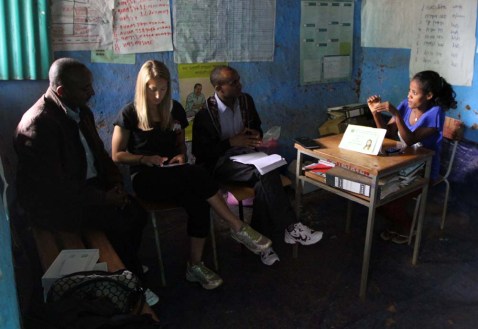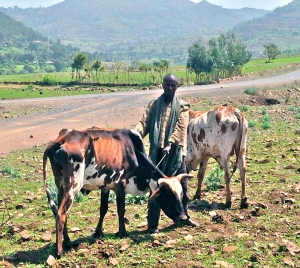Interviews and data collection
Data collection, shoulder dancing, and tailored suits
By Korbin Smith
Student, Ohio State College of Medicine
School of Health and Rehabilitation Sciences
The initial data collection for the project has been finished. Our group was unable to blog or access the internet over the last week due to traveling in small towns throughout Ethiopia that don’t have internet. To catch up, we traveled from Gondar to Woreta where we conducted interviews before moving to Debre Tabor. It is crazy how different the climate can change  here with a 40 minute drive. Woreta has a warm climate with temperatures probably averaging around 80 degrees. A 40 minute drive to the highland in the mountains and Debre Tabor was probably around 55-60 degrees.
here with a 40 minute drive. Woreta has a warm climate with temperatures probably averaging around 80 degrees. A 40 minute drive to the highland in the mountains and Debre Tabor was probably around 55-60 degrees.
Luckily for me, this means I now have a cold. I am beginning to think I have a weak immune system, as I am always the only one to get sick. From Debre Tabor we met with Dr. Gebreyes, who brought a photographer and Dr. Sauvageau, a neurosurgeon from Ohio State. It was good to see others from Ohio. We drove to Bahir Dar which is the city that borders Lake Tana, the biggest lake in Ethiopia. Being a fishing connoisseur, it was very neat to see the traditional fishing methods.
We celebrated finishing the data by going to a traditional Ethiopian club in which we saw many styles of “shoulder dancing.” I think I can dance better in Ethiopia than in the U.S. As long as you can move your shoulders to the music you can be accepted as a dancer here. People are less inclined to judge me on my overall lack of rhythm (or if they are judging me it is in Amharic and I can’t tell).

Once we returned to Gondar I was happy to pick up the suit that I had ordered in the city aweek ago. Since I am a rather tall, skinny, and lengthy individual, the suits already made did not fit me. Dr. Tamiru, a partner we have been working with, took me to his tailor who agreed to make me a suit from the cloth of my choosing for 1,900 birr. While that might seem like a lot in the U.S. that is equivalent to 100 USD. This is extremely inexpensive for a customized tailored suit. The suit fits excellently.
In addition to completing the data collection, I have appreciated experiencing different aspects of the culture here in Ethiopia.
Data collection in Debark
By Karissa Magnuson
Student, Ohio State College of Veterinary Medicine
For the past two days we have been in Debark, a town about 100 kilometers north of Gondar. Debark was our second data collection site for our rabies research project.
It is a common resting place for tourists who wish to visit the Simien Mountains. On our two-hour drive up to the city, we passed stunning scenery. The countryside is full of lush, rolling hills and looks like a patchwork quilt of rich coffee brown fields and vibrant green countryside.
We passed many farmers out plowing their fields with oxen and an old-fashioned plow. It was idyllic, and I felt like I had stepped back into a different time. It was hard to go five minutes without seeing a shepherd out with his flock of goats or sheep, and there were always cows, goats, and sheep grazing in the distance. Our van had to stop or slow down a few times as wandering goats, sheep, and cattle crossed the road.
The people of Debark were very friendly and accommodating. For the project, my team was in charge of urban adults and children. It was truly a privilege to be able to walk their streets and be invited into their houses, especially since they knew nothing about me. Every house we went to, I was offered a chair or a place to sit, and a few times, they roasted a snack for me over their fire for me to eat. The hospitality here was truly amazing.
Our last day of data collection, we went up to a small neighborhood on a hill. Immediately we were surrounded by a huge group of children, all probably under the age of 10. They were all extremely friendly and asked me my name.
As my Ethiopian team members told them about the study and asked if they would like to participate, one of the little girls grabbed my hand.
All the children were eager to participate in the study. As we followed them back to their houses, my other hand was grabbed by a little boy, and I was led off down the dirt road to their homes. Walking from one house to another, my hand was never empty. At one point, two of the children had a little disagreement about who actually got to hold my hand.
When we finished our data collection and were saying goodbye, all the children who had followed us around came over to me and shook my hand, and we touched shoulders. In Ethiopia, when you greet someone you shake hands and touch shoulders with the person. There must have been six or seven kids in line to say goodbye to me. It was truly a heartwarming and memorable experience that I will carry with me forever.
If generosity equaled power Ethiopia would control the world
By Korbin Smith
Student, College of Medicine
School of Health and Rehabilitation Sciences
As we began our interviews with the locals I was amazed how easy it was to get people to volunteer. Everybody in this country wants to talk and help.
My group consisting of Dr. Atnaj Alebie and Tadele Atinafu have been more than helpful. They are brilliant professionals as well as very kind and humble people.
Together we were able to collect our first set of data in rural areas successfully and efficiently. Hearing what the rural adults and children believed caused rabies was truly incredible.
While many answers cause me to be concerned about their safety in an area where rabies is prevalent, it is inspiring to know that our work is needed.


